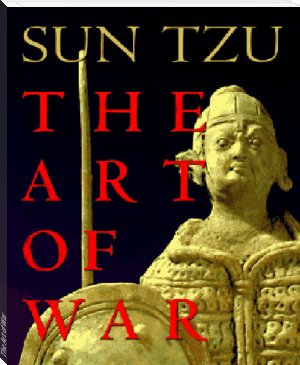The Art of War by Zi Sun (phonics reader .txt) 📖

- Author: Zi Sun
- Performer: 0976072696
Book online «The Art of War by Zi Sun (phonics reader .txt) 📖». Author Zi Sun
[Tu Yu quotes Wang Tzu as saying: "Without constant practice, the officers will be nervous and undecided when mustering for battle; without constant practice, the general will be wavering and irresolute when the crisis is at hand."]
7. HEAVEN signifies night and day, cold and heat, times and seasons.
[The commentators, I think, make an unnecessary mystery of two words here. Meng Shih refers to "the hard and the soft, waxing and waning" of Heaven. Wang Hsi, however, may be right in saying that what is meant is "the general economy of Heaven," including the five elements, the four seasons, wind and clouds, and other phenomena.]
8. EARTH comprises distances, great and small; danger and security; open ground and narrow passes; the chances of life and death. 9. The COMMANDER stands for the virtues of wisdom, sincerity, benevolence, courage and strictness.
[The five cardinal virtues of the Chinese are (1) humanity or benevolence; (2) uprightness of mind; (3) self-respect, self- control, or "proper feeling;" (4) wisdom; (5) sincerity or good faith. Here "wisdom" and "sincerity" are put before "humanity or benevolence," and the two military virtues of "courage" and "strictness" substituted for "uprightness of mind" and "self- respect, self-control, or 'proper feeling.'"]
10. By METHOD AND DISCIPLINE are to be understood the marshaling of the army in its proper subdivisions, the graduations of rank among the officers, the maintenance of roads by which supplies may reach the army, and the control of military expenditure. 11. These five heads should be familiar to every general: he who knows them will be victorious; he who knows them not will fail. 12. Therefore, in your deliberations, when seeking to determine the military conditions, let them be made the basis of a comparison, in this wise: — 13. (1) Which of the two sovereigns is imbued with the Moral law?
[I.e., "is in harmony with his subjects." Cf. ss. 5.]
(2) Which of the two generals has most ability?
(3) With whom lie the advantages derived from Heaven and
Earth?
[See ss. 7,8]
(4) On which side is discipline most rigorously enforced?
[Tu Mu alludes to the remarkable story of Ts`ao Ts`ao (A.D. 155-220), who was such a strict disciplinarian that once, in accordance with his own severe regulations against injury to standing crops, he condemned himself to death for having allowed his horse to shy into a field of corn! However, in lieu of losing his head, he was persuaded to satisfy his sense of justice by cutting off his hair. Ts`ao Ts`ao's own comment on the present passage is characteristically curt: "when you lay down a law, see that it is not disobeyed; if it is disobeyed the offender must be put to death."]
(5) Which army is stronger?
[Morally as well as physically. As Mei Yao-ch`en puts it, freely rendered, "ESPIRIT DE CORPS and 'big battalions.'"]
(6) On which side are officers and men more highly trained?
[Tu Yu quotes Wang Tzu as saying: "Without constant practice, the officers will be nervous and undecided when mustering for battle; without constant practice, the general will be wavering and irresolute when the crisis is at hand."]
(7) In which army is there the greater constancy both in
reward and punishment?
[On which side is there the most absolute certainty that
merit will be properly rewarded and misdeeds summarily punished?]
14. By means of these seven considerations I can forecast victory or defeat. 15. The general that hearkens to my counsel and acts upon it, will conquer: —let such a one be retained in command! The general that hearkens not to my counsel nor acts upon it, will suffer defeat: —let such a one be dismissed!
[The form of this paragraph reminds us that Sun Tzu's treatise was composed expressly for the benefit of his patron Ho Lu, king of the Wu State.]
16. While heading the profit of my counsel, avail yourself also of any helpful circumstances over and beyond the ordinary rules. 17. According as circumstances are favorable, one should modify one's plans.
[Sun Tzu, as a practical soldier, will have none of the "bookish theoric." He cautions us here not to pin our faith to abstract principles; "for," as Chang Yu puts it, "while the main laws of strategy can be stated clearly enough for the benefit of all and sundry, you must be guided by the actions of the enemy in attempting to secure a favorable position in actual warfare." On the eve of the battle of Waterloo, Lord Uxbridge, commanding the cavalry, went to the Duke of Wellington in order to learn what his plans and calculations were for the morrow, because, as he explained, he might suddenly find himself Commander-in-chief and would be unable to frame new plans in a critical moment. The Duke listened quietly and then said: "Who will attack the first tomorrow — I or Bonaparte?" "Bonaparte," replied Lord Uxbridge. "Well," continued the Duke, "Bonaparte has not given me any idea of his projects; and as my plans will depend upon his, how can you expect me to tell you what mine are?" [1] ]
18. All warfare is based on deception.
[The truth of this





Comments (0)